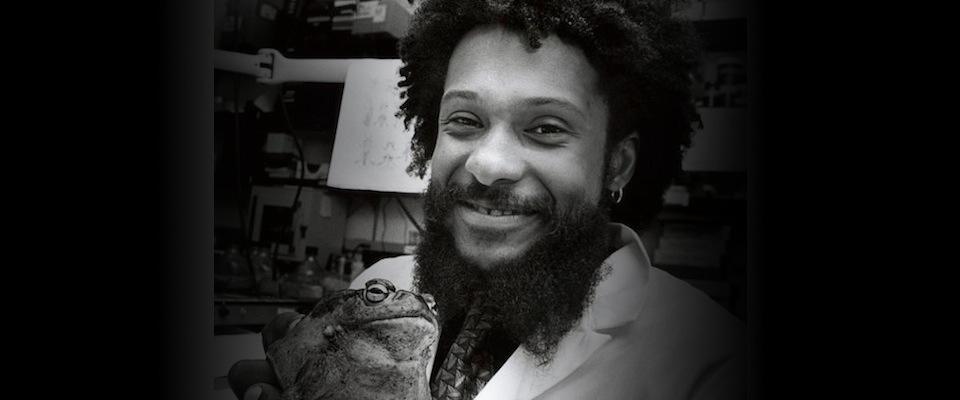Just because you’re paranoid doesn’t mean they aren’t out to get you—or that the New Yorker won’t make you the subject of an 8,000 word profile.
This week the magazine offers the latest, and certainly the most high-profile, account of academic science’s most remarkable David and Goliath battle. And now Berkeley biologist Tyrone Hayes, the famous and famously provocative, professor of endocrinology who has spent the last 15 years engaged in a brutal and bizarre public relations war with the Swiss pesticide manufacturer Syngenta, has plenty of reasons to say, “I told you so.”
“My reaction in some ways is like when you hear about someone who has been in prison for 10 years and is finally released on DNA evidence,” says Hayes. “They’re asked, ‘How do you feel?’ Well, I feel good—but I was also in prison for 10 years!”
Hayes’ metaphorical “sentence” began in 1997 when he took a contract research job with a consultancy group hired by Syngenta to study its widely used herbicide, atrazine. After Hayes reported a link between exposure to the chemical weed killer and abnormal sexual development in frogs, the relationship between Syngenta and the scientist soured.
The New Yorker’s lengthy chronicle of the dispute that followed, penned by Rachel Aviv, is not the first. Hayes was profiled in Mother Jones in 2012 and the Chronicle of Higher Education took a look at the controversy after Hayes’ lab ran out of funding last summer. CALIFORNIA Online filed our own reports on the dispute as well.
But because the New Yorker reaches a larger audience, and has a reputation for thorough reporting and unassailable respectability, it’s hard not to feel just a little bit vindicated, says Hayes.
“It’s been crazy,” he says of the reaction so far. “I’ve received hundreds of emails. It’s all over Twitter, all over Facebook. Some anonymous donors have called the lab. I’ve got a lot of support from the academic community. The New Yorker really puts things out in the mainstream.”
If Twitter alone is representative of the readership at large, the response has been overwhelmingly in Hayes’ favor. So far on social media, Syngenta’s campaign against Hayes has been characterized as “chilling,” “sinister,” and “character assassination.”
The profile doesn’t always depict Hayes in the most flattering light—it is a portrayal of a dedicated scientist who is both brilliant and idealistic, but also at times self-aggrandizing, insecure, and lacking the clinical aloofness that often constitutes professionalism in the halls of academia. Even so, Syngenta comes off much worse. The story archives the corporation’s aggressive campaign to discredit Hayes (along with anyone else who has raised concerns over the safety of atrazine), which includes sending employees to publicly question his research at conferences, planting pro-atrazine op-ed pieces, buying search engine results to counter Hayes’ work, and at least once, considering an investigation of Hayes’ wife.
At first glance, it’s hard to understand why this conflict has gone on for so long given its seeming simplicity. Ultimately, Syngenta and Hayes’ disagreement comes down to what ought to be a relatively straightforward question: Does atrazine disrupt male reproductive development in frogs? In simpler terms, do we need to worry about the safety of the second most widely used herbicide in the United States?
Of course, it depends on whom you ask. In her report on the back-and-forth between the company and the academic, Aviv places this individual battle in the context of a the so-called “Sound Science” campaign—a common strategy among industry and industry-backed advocacy groups to discredit any research (and researchers) that could provide empirical support for new regulation. The piece notes how the tobacco industry fended off regulation by questioning the science of secondhand smoke, and then quotes from a book by Assistant Secretary of Labor for Occupational Safety and Health David Michaels: “Industry has learned that debating the science is much easier and more effective than debating the policy. In field after field, year after year, conclusions that might support regulation are always disputed. Animal data are deemed not relevant, human data not representative, and exposure data not reliable.”
That in turn raises some uncomfortable truths, both for those in the scientific community and those who put a great deal of faith in the clear-eyed elucidatory power of science. As it turns out, science may not be that rarefied sphere we all like to think it is: a meritocracy of ideas, isolated from political and financial realities, where the best minds and best analyses always rise to the top. As Miami University professor Michelle Boone says in the article, “the science doesn’t speak for itself. Industry has unlimited resources and bully power.”
“I always knew I wasn’t paranoid! And anyway, it’s possible to be paranoid, but still not be crazy.”
The waters are muddied all the more, writes Aviv, when policy makers and policy making are involved. Quoting from a memo from the D.C. communications consultancy organization the White House Writers Group, the article reads: “it is important to keep in mind that the major players in Washington do not understand science.”
“For a long time, Syngenta was able to hide behind the EPA, saying, ‘well, the EPA has found no problems with atrazine,’ ” says Hayes. “Now you have all these people (featured in the article) from the EPA science panel saying that the agency has made the wrong decisions.”
As the article reports, the EPA is conducting a fresh safety review of atrazine this year.
Although publication of this article has no doubt boosted Hayes’ reputation, his troubles are not over. As we reported last August, the biology professor ran out of funding for his lab after being charged with what he claimed were exorbitant animal care fees. The university countered that Hayes’ fees simply reflect the unique type of cages that he uses.
As per our conversation with Hayes today, it’s fair to say that the dispute is still ongoing.
Still, particularly in academia, reputation counts for a lot. Hayes’ many, vocal claims over the years that Syngenta had been targeting him, following him, plotting against him, can no longer be dismissed out of hand by the company—or by the public at large.
Speaking on NPR this week, Rachel Aviv said as much. “Hayes is still giving all of his lectures—his fifty lectures a year,” she told Melissa Block’s All Things Considered. “But he is doing it, I think, with the knowledge that he is not this paranoid extremist. His fears were real.”
For his part, Hayes agrees, but only to a point.
“I always knew I wasn’t paranoid!” he says. “And anyway, it’s possible to be paranoid, but still not be crazy.”



















